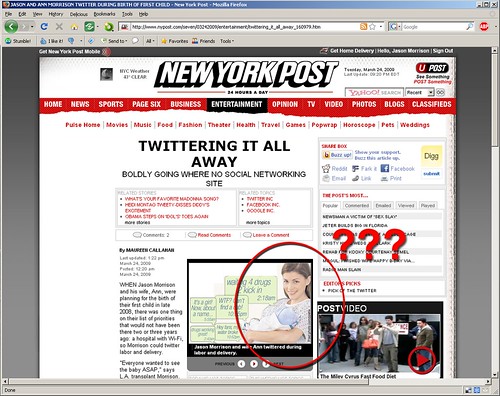I saw this on Reddit and had to comment. Follow this link. From now on if you want to quote an AP story in your blog, link to an AP headline, or email an article to your grandmother, this is the page they want you to see – including a price list that I’ll quote here:
| Words | Fees |
|---|---|
| 5 – 25 | $12.50 |
| 26 – 50 | $17.50 |
| 51 – 100 | $25.00 |
| 101 – 250 | $50.00 |
| 251 and up | $100.00 |
No, I am not making this up. The AP is really asking people to pay them $12.50 if they quote more than four words of any story. A nice long sentence with 26 words will cost you $17.50. Presumably this includes headlines, meaning the AP could come looking for cash if you even link to one of their stories with the relevant text.
Let’s put aside the fundamental misunderstanding of how the web works for a moment, and put it in terms that most journalists should understand: This pricing scheme amounts to prior constraint on any substantive criticism of the AP. One of the most important reasons we have fair use rights is to excerpt material for commentary or criticism. The AP says that this effort is directed against copyright infringement and sites that scrape and monetize their stories, but quoting 5, 25, even 50 words from an article is in most cases not copyright infringement–it’s attribution.
The AP runs stories on medical topics all the time. If a doctor wants to point out an error in an AP story on their blog, we had better hope they have the cash. Could you imagine being misidentified as the suspect in a crime, only to have the AP bill you when you point out the correction? It’s not like the AP never makes mistakes.
Heaven forbid someone working for a competing news agency wants to criticize the AP’s coverage for bias or political slant. That would require quoting sentences from many articles – perhaps thousands of dollars.
The AP even has the gall to quote prices for educational use. I’m sure the numerous Supreme Courts deciding Fair Use cases over the years would be pleased – it goes against all precedent, but hey, a coupon!
Outside of criticism, the AP’s own guidelines tell you why this is so important:
We should give the full name of a source and as much information as needed to identify the source and explain why he or she is credible. Where appropriate, include a source’s age; title; name of company, organization or government department; and hometown.
If we quote someone from a written document – a report, e-mail or news release — we should say so.
It’s just as important for writers in other media to use proper attribution. Writers should use direct quotes when it’s the fairest way to represent what someone else has said or written. How would the AP operate if every source they quoted demanded payment up front?
But, of course, they would never:
It means we don’t pay newsmakers for interviews, to take their photographs or to film or record them.
This makes me sad. I’m a big proponent of professional journalism and I hate to see newspapers in such dire straits. But if this is representative of what the industry plans to do, I’m not sure they have much of a chance.

